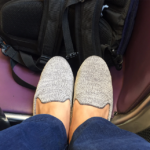
Should she wait for a year to save more? Or should she take advantage of a rising market and relatively low interest rates?
Ian and his girlfriend live together in Washington D.C. and have a combined 40 percent savings rate. He’d like to buy a rental property, but his girlfriend has $18,000 in student loans and is about to re-enroll in school. Should they buy an investment home, or use their cash to repay her loans and cash flow her new academic program?
Annette is about to travel to Spain with her family. How can she plan an affordable and high-value international trip?
William is concerned about losing his job. What if he can’t pay his bills, especially his new mortgage? How can he protect himself?
Anonymous is a renter, and she often encounters surprise fees and charges when she arrives at the lease signing. Can she negotiate with her landlord?
I answer these five questions in today’s episode, and I also feature a short interview with special guest J. Money, my former podcast co-host from the early days!!
Enjoy!
Here are more details:
Ian asks:
I’m 29 and I live with my long-time girlfriend in D.C. My partner has roughly $23,000 in investments and is contributing to a 401(k) and a Vanguard Roth IRA. I’ve got about $85,000 in investment accounts and contribute to a Roth IRA and an employee 401(k) account. Collectively, we make about $170,000/year.
We also have roughly $20,000 – $22,000 in cash, keeping our expenses low, and are saving roughly 40% of our take-home pay.
My partner has around $18,000 in student loan debt, but will have to make additional payments for a graduate school program that will increase her earning potential by around 40%. The cost of the program is roughly $45,000.
Given that her current loan’s interest rate is low, we treat it like an expense to be paid off every month, and if everything goes well, her debt should be forgiven in the next five years.
I want to create a passive income stream by becoming a real estate investor, but also know how great it would feel to finish paying off my partner’s $18,000 + $45,000 in the short-term.
I have two questions:
- How would you go about framing whether or not to invest in a rental property versus using the cash on hand and additional earnings to pay off the cost of school immediately.
- It’s difficult to find a reasonably-priced house to live in in D.C. How would you recommend I adapt a househacking strategy to work here, or should I look for another plan entirely? I want to invest in a property ASAP.
Anonymous asks:
I’m a renter in a high-cost-of-living area, and one thing I’ve noticed is that I might agree to rent at a property, and when I get the lease, I realize there are a bunch of extra fees that I didn’t anticipate.
To what extent do you think renters have the ability to negotiate the terms of a lease?
Annette asks:
How do you plan your vacations? What are your favorite booking websites for international travel? Do you have any discount airlines you love or stay away from? How can I tell if a hotel is in a safe area if I’m booking online?
I’m planning a two to three week trip to Spain this June with my husband and 5-year-old son. We prefer unstructured travel, so I don’t want to book anything ahead of time except the hotel where we’re staying for the first few nights. Any tips on how to do this inexpensively?
Ashley asks:
My husband and I live in the Atlanta area and we have no debt and a three-month emergency fund. We have a great rental situation – we pay $1,060/month with everything included. We want to have our own house, though.
We’ve been renting this place for four years, and I know interest rates are rising, so we are debating on what we should do when our lease ends in August.
Should we save up to put 3-5% down on a house that’s $250,000 – $275,000, or should we sign another year lease, and save more cash?
I’m torn between both options and would appreciate your insight.
William asks:
My wife and I recently bought our first house, and our monthly mortgage payment is close to $1,400. What if I lose my job and can’t make the monthly payment? I have some money for emergencies, but if my unemployment lasts a while, I don’t want to default on my mortgage. What should I do to protect in this scenario?
Marcela asks:
We’re a family of four. We’re moving to Texas from South Korea, and we want to live in a particular school district for the next 4-6 years, while our two teenagers are still in high school. We could rent a home for $3,500 per month. Alternately, we could buy a home for between $250,000 to $550,000, and we can offer a 20 percent downpayment and qualify for a 30-year mortgage.
Resources Mentioned:
- NYTimes Rent vs. Buy Calculator
- Airbnb
- VRBO
- Lonely Planet Guides
- Roomkey
- LastMinute.com
- Hipmunk
- Kayak.com
- Hotel Tonight – app
- Hosteling International
- Flights.google.com
- Easy Jet
- RyanAir
- AirAsia
- Expedia
- Orbitz
- TripAdvisor
- Rome2Rio
- Skyscanner
Thanks to our sponsors!
Grove.co
Grove makes shopping for natural products easy. You don’t have to search for a local store hoping that they carry what you want, and you don’t need to worry about overpaying for “organic” products from questionable sites. Interested? Go to grove.co/affordanything to get a free five piece spring cleaning set from Mrs. Meyer and Grove!
Radius Bank
Do you want your money to make more money? Then check out Radius Bank’s free high-interest checking account. You earn 1.00% APY on balances of $2,500 and up. There are free ATM’s worldwide, no monthly fees, and they’ll rebate ATM fees charged by other banks! To get started, head over to radiusbank.com/paula.
Gusto
Gusto makes payroll, benefits, and HR easy for modern small businesses. In fact, 72% of customers spend less than 5 minutes to run payroll! If you sign up at gusto.com/paula, you’ll receive 3 months free once you run your first payroll.

Rothy’s are great for travel!
Rothy’s shoes are stylish, sustainable, and comfortable for every day wear, anywhere. They come in four styles, their lineup is updated often, and I love that they make flats from recycled plastic water bottles! If you want to order a pair, go to rothys.com/paula.